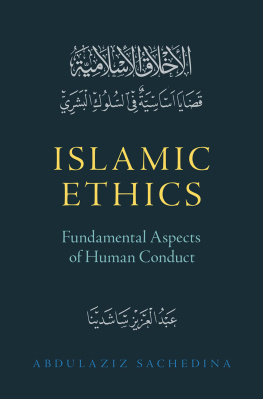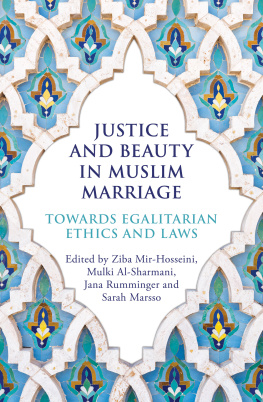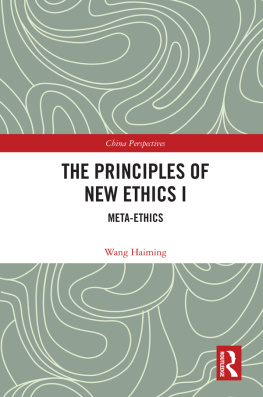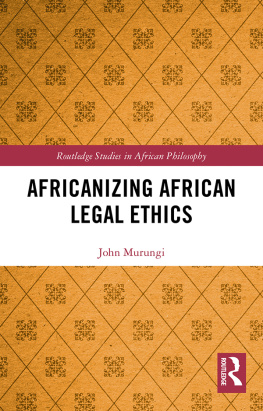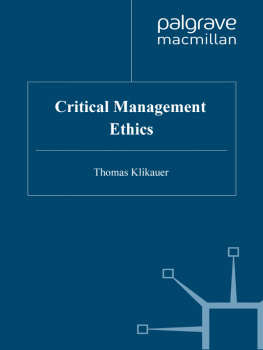Islamic Ethics

Oxford University Press is a department of the University of Oxford. It furthers the Universitys objective of excellence in research, scholarship, and education by publishing worldwide. Oxford is a registered trade mark of Oxford University Press in the UK and certain other countries.
Published in the United States of America by Oxford University Press
198 Madison Avenue, New York, NY 10016, United States of America.
Oxford University Press 2022
All rights reserved. No part of this publication may be reproduced, stored in a retrieval system, or transmitted, in any form or by any means, without the prior permission in writing of Oxford University Press, or as expressly permitted by law, by license, or under terms agreed with the appropriate reproduction rights organization. Inquiries concerning reproduction outside the scope of the above should be sent to the Rights Department, Oxford University Press, at the address above.
You must not circulate this work in any other form and you must impose this same condition on any acquirer.
Library of Congress Control Number: 2021941267
ISBN 9780197581810
eISBN 9780197581834
DOI: 10.1093/oso/9780197581810.001.0001
To
my teachers
and
my students
over the
past sixty years
This book was commissioned as part of the Contending Modernities Initiative at the University of Notre Dame, and supported by a grant to Contending Modernities and its Science and the Human Person working group by the Henry Luce Foundation.
Contents
of strictly theological and juridical discourses in Islam. The arguments developed in the present work refer to all my earlier publications that led me to call attention to the moral nature of religious thought in Islam. Additionally, the present study embarks on synthesizing my studies in theology and jurisprudence, which, in turn, will bring juridical theology and Islamic ethics into conversation.
My academic interest in ethics has been in working for many years. I was determined to present well-researched and well-thought-out theses about locating the possibility of Islamic ethics in Islamic interpretive jurisprudencethe ethicization enterprise. A major inspiration for this project of relating ethical reasoning to jurisprudence was provided by Richard M. Franks indicative observation about moral obligation in Sunni theology. In that book he underscores the importance of expounding ethics in interpretive jurisprudence that undertakes to elaborate Islamic scriptural sources as they connect to fundamental aspects of comprehensive human conduct.of questions that are now relatively competently answered to support the main thesis of the book, namely, that Islamic ethics is not only integral to the development of juridical methodology and extrapolation of vast numbers of judicial opinions related to social ethics; it is also a critical component of the entire religious worldview presented by the Quran. Any shortcoming in my appraisal of ethical issues related to human relations is mine.
I have dedicated this book to all my teachers and a number of my students who during these six decades have directed my research interests and critiqued my published works, assisting me to sharpen my thought regarding Islamic ethics. Obviously, without intellectually stimulating conversations with my colleagues, among them James Childress, David Novak, David Little, and Charles Mathewes, all experts in ethics at the University of Virginia, I would have been deprived of the fundamental comprehension of the extent of moral reasoning and the ways in which it has shaped secular modernity and its ethical backdrop.
My commitment to work on the relationship between law and ethics emerged in my intellectual interactions with colleagues working on the Contending Modernities Initiative at the University of Notre Dame. Scott Appleby and Ebrahim Moosa supported the project by becoming the critical interlocutors for stimulating and adjusting the rough edges of this research. Under Scott Applebys direction this book was commissioned as part of this initiative and supported by a grant to Contending Modernities and its Science and the Human Person working group by the Henry Luce Foundation. There are a number of colleagues in Iraq and Iran who provided highly appreciated hospitality during my sojourn in 201415. Without their support this research would not have achieved its goal. I need to acknowledge at least three colleagues in Najaf: Dr. Hassan Nadhem, director of UNESCO Chair in Interreligious Studies; Professor Dr. Aqeel A. Mubdir Alkhaqani, dean of the Faculty of Arts; and Professor Dr. Akeel Abed Yasseen, president of the University of Kufa, Najaf. In Iran, Dr. Mohammedreza Hashemi, vice president for academic affairs, and Dr. Ali Yousofi, vice president for sociocultural affairs, at Ferdowsi University of Mashhad, provided valuable help in locating research assistants and accessing the resourceful libraries connected with the shrine in Mashhad and Qom.
At my home institution, the College of Social Sciences and Humanities and the provosts office at George Mason University supported the project in comparative ethics by granting me research leave. Becky Hartleys team from the Office of Research Integrity and Assurance provided the critical guidance and paperwork that took care of the compliance requirements for traveling to Iraq and Iran.
At Oxford University Press, Cynthia Read, with whom I have worked on all my OUP publications since 1988, gave enormous support to enable smooth publication of this volume.
morality (Q. 91-7-10) that shaped human character through natural and social relationships. In order to be perfected, human beings had to undergo a process whereby they became what they were to be. Unlike any other being, human beings were endowed with the capability to be more or less than human. More important, this infused morality was available to all humans regardless of connection to a confessional community. Technically, morality founded upon naturally endowed human constitution was regarded as capable of creating processes to guide relationships within and outside other communities.
Based on this possible relationship between the early history of Islam and emerging moral discourse as the community settled in various regions of the empire, my long-standing research question has remained consistent: Is it possible for a document like the Quran, which initiated its emphasis on common moral constitution (fira) upon which humanity was created and expected to become one community, to ignore ethics as the main constituent of its collective emphasis on justice and unity, and to insist upon absolute homogeneity based on religious creed? For the Quran to ignore variations in the choice of spiritual path and relativity in human cultures and traditions would have meant the demise of its notion of morally cohesive humanity, potentially united in its emphasis on fairness and empathy in dealing with one another.
From my readings in scriptural interpretation among Muslims I always found hesitation among the prominent exegetes to genuinely explore the possibility that infused morality should be expounded as having no relation with confessional doctrine that limited salvation to the believers only. The Quran, based on its account of the previous monotheistic communities that discredited one another in their claim of exclusive salvation, was desirous of overcoming the same kind of exclusivist preunderstanding about the soteriological claim regarding the singularity of Islam. Obviously, such an exclusivist preunderstanding would have hampered Islams ability to demonstrate the universal moral values that overshadowed religious differences to forge coexistence based on common emphasis on morality as a source of unity among human beings (compete with one another in doing good: message of Q. 5:48). The core of the Quran was and remains spiritual equality founded upon common moralitysocial ethical sensibilities generated by ones faith in God. It is very clear from the importance the Quran attaches to the innate moral nature (

